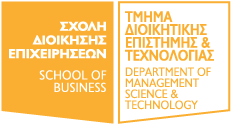E-learning and Knowledge Management
Course Description
The course comprises two units.
Unit 1: E-Learning
- Workplace learning, employee performance and the role of technology: concepts, methods and tools
- E-learning platforms, technologies, and instructional content development tools
- Methods for digital instructional design
- Issues of eLearning Implementation and Management
Unit 2: Knowledge Management
- New Challenges – New Organizational Forms.
- Knowledge Management: Definitions of notions, measuring intellectual capital, Types and forms of knowledge, Knowledge objects, Knowledge and competitiveness, Overview of tools for knowledge management.
- Knowledge and Innovation
Learning Outcomes
This course offers an overview of the most recent trends in learning and knowledge management in companies and organizations. Students will be introduced to strategies, methods and technologies of organizational learning and knowledge management, helping them to develop analytical, development and judgmental skills. Students will be able to relate organizational and technological choices to performance improvements in organizations in the context of changing organizational environments. Practical skill in the implementation of e-learning programs and systems are also emphasized.
The course comprises two units; (1) E-Learning and (2) Knowledge Management.
In the first unit, students are introduced to concepts of organizational and workplace learning, training in the context of human resource development, and performance management. Methods and tools for digital instructional design are explained and then applied in practice by students in their course assignments.
In the second unit, after successfully completing the course, students will be able to:
- Identify, describe and recognize different types of knowledge and different forms of knowledge in an organization.
- Explain how types and forms of knowledge can be managed for organizational effectiveness and competitive advantages.
- Combine enablers and knowledge management tools to design effective knowledge management structures.
- Compare and evaluate approaches and knowledge management and KM systems using case studies.










 76 Patission Str.
76 Patission Str. +30 210 8203129, 8203139
+30 210 8203129, 8203139 
